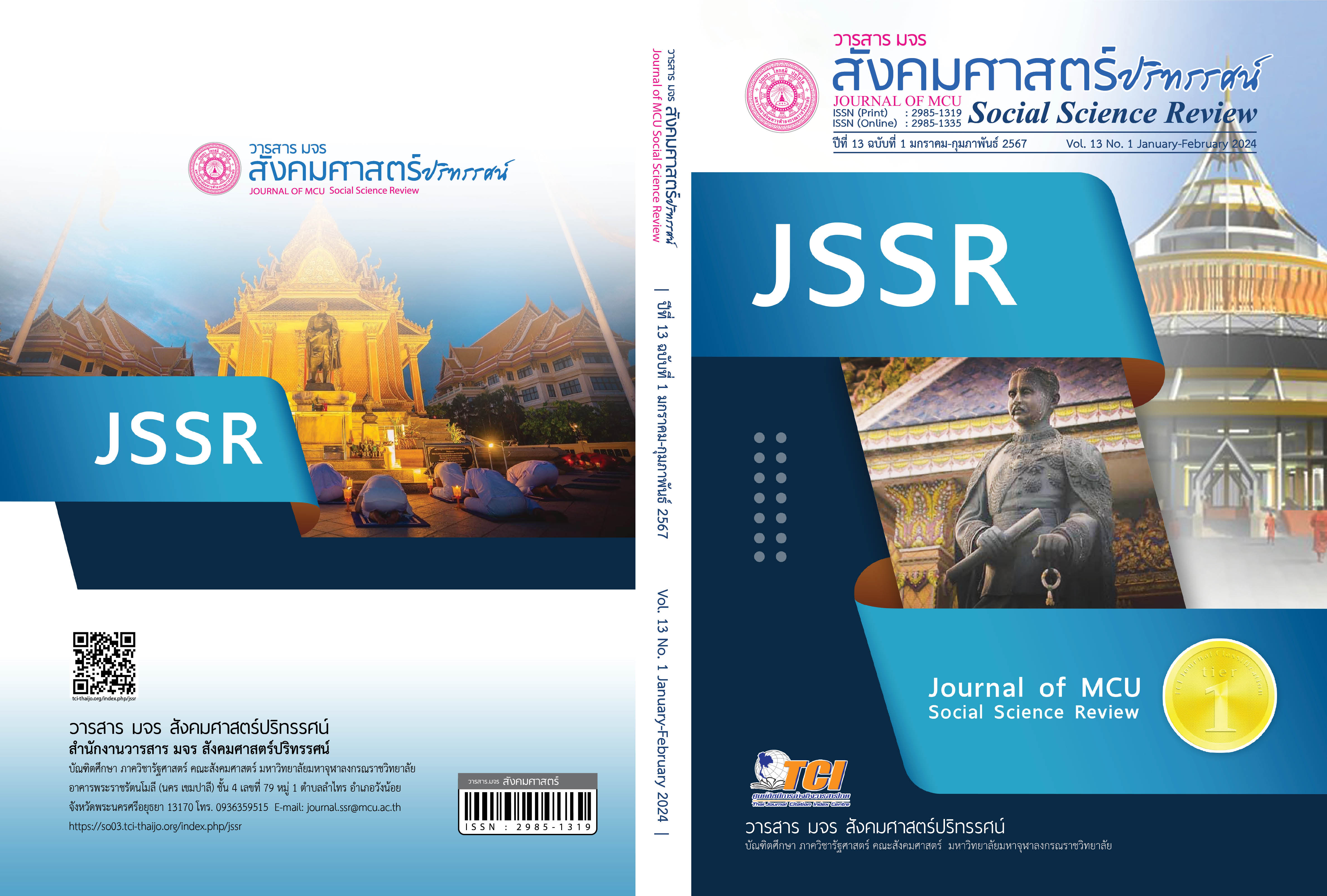สัญชาตญาณแห่งการยอมรับในพระเป็นเจ้า และจริยศาสตร์เชิงกรณียธรรม: กระบวนการปลูกฝังธรรมชาติความเป็นมนุษย์
คำสำคัญ:
พระเป็นเจ้า, จริยศาสตร์เชิงกรณียธรรม, ธรรมชาติความเป็นมนุษย์บทคัดย่อ
บทความนี้พิจารณาองค์ประกอบพื้นฐานแห่งความเป็นมนุษย์ที่ใช้สำหรับกระบวนการปลูกฝังธรรมชาติความเป็นมนุษย์ โดยสัญชาตญาณการเชื่อในพระเป็นเจ้าเป็นหนึ่งในคุณลักษณะสำคัญแห่งความเป็นมนุษย์ที่มีมาแต่กำเนิด เช่นเดียวกับการที่มนุษย์ให้การยอมรับการมีอยู่ของสามัญสำนึกอื่นๆ เช่น ความเป็นเหตุเป็นผล และข้อเท็จจริงอื่นๆ ที่เป็นสากล ผ่านวิธีการคิดเชิงสัญชาตญาณ ในทางกลับกันกระบวนการปลูกฝังธรรมชาติความเป็นมนุษย์ที่เน้นการคิดเชิงวิเคราะห์ มีความเชื่อมโยงกับการเป็นมูลเหตุสำคัญในการลดสถานะพระเป็นเจ้าลงให้อยู่ในสภาพ “พระเป็นเจ้าแห่งช่องว่าง” และนั่นจึงหมายถึงความจำเป็นต้องปฏิเสธบรรทัดฐานทางศีลธรรมแบบปรวิสัย และยอมรับบรรทัดฐานทางศีลธรรมประเภทอันตวิทยาแทน กล่าวคือ เป็นการปรับเปลี่ยนกระบวนทัศน์ทางศีลธรรมแบบจริยศาสตร์เชิงกรณียธรรมให้เป็นการตัดสินความถูกต้องของการกระทำที่ขึ้นอยู่กับผลของการกระทำ โดยไม่จำเป็นต้องคํานึงถึงกฎเกณฑ์และจารีตทางศีลธรรมที่มีอยู่เดิม ในแง่นี้ จึงถือได้ว่า เป็นกระบวนการปลูกฝังธรรมชาติความเป็นมนุษย์ที่ขัดแย้งกับสัญชาตญาณความเป็นมนุษย์
เอกสารอ้างอิง
โกมาตร จึงเสถียรทรัพย์ และนภนาท อนุพงศ์พัฒน์. (2560). สุขภาพทางปัญญา: จิตวิญญาณ ศาสนาและความเป็นมนุษย์. นนทบุรี: โอ.เอส.พริ้นติ้งเฮาส์.
Adkins, A. W. H. (2022). Greek religion. Encyclopædia Britannica. Retrieved November 21, 2022, from https://www.britannica.com/topic/Greek-religion
Alexander, L., & Moore, M. (2020). Deontological ethics. Stanford Encyclopedia of Philosophy. Retrieved October 26, 2022, from www.plato.stanford.com
Britannica. (2016). Human nature. Encyclopædia Britannica. Retrieved February 6, 2023, from https://www.britannica.com/topic/human-nature
Brown, T. (2022). Taoism National Geographic Society. Retrieved November 15, 2022, from https://education.nationalgeographic.org/resource/taoism
Citizen Witness. (2022). Disgusting! man caught shagging a dead chicken. Retrieved October 27, 2022, from https://citizenwitness.co.ke
Copson, A. (2018). The ethics of education in the secular state. Philosophy Now: a magazine of ideas. Retrieved October 27, 2022, from https://philosophynow.org/issues/129/
Craig, W. L. (2008). Reasonable Faith: Christian Truth and Apologetics Wheaton. Illinois: Crossway Books.
Goroncy, J. (2008). In the Beginning: An Interview with Olivera Petrovich. Retrieved October 9, 2022, from https://paternallife.wordpress.com/
Gritz, J. R. (2005). Wired for creationism? The Atlantic. Retrieved November 15, 2022, from https://www.theatlantic.com/magazine/archive/
Hackett, C., & McClendon, D. (2020). Christians remain world's largest religious group, but they are declining in Europe. Pew Research Center. Retrieved October 26, 2022, from https://www.pewresearch.org
Hill, E. R. (2011). Can Religious-Based Ethics Play a Role in Development. Retrieved October 26, 2022, from http://www.inquiriesjournal.com/a?id=567
Hull, D. L. (1986). On Human Nature. PSA: Proceedings of the Biennial Meeting of the Philosophy of Science Association. Retrieved October 26, 2022, from https://shorturl.asia/oW3Y7
Hunter, E. A. (2018). Who is the god of confucianism? Synonym. Retrieved November 15, 2022, from https://classroom.synonym.com/who
Hutson, M. (2020). 8 truths about intuition. Psychology Today. Retrieved February 6, 2023, from www.psychologytoday.com/intl/articles/
Jeste, D. V. & LaFee, S. (2020). Wiser: The scientific roots of wisdom, compassion, and what makes Us good. Colorado: Sounds True.
Lehrer, K. (2006). The Epistemology of Testimony. Retrieved February 6, 2023, from https://shorturl.asia/DALIH
Martel, Y. (2001). Life of pi. New York: Houghton Mifflin Harcourt Publishing Company.
Marx, K. (1975). Contribution to the Critique of Hegel's Philosophy of Law: Introduction in Marx and Engels Collected Works (Volume 3). Moscow: Progress Publishers.
McCrea S. M. (2010). Intuition, insight, and the right hemisphere: Emergence of higher sociocognitive functions. Psychology research and behavior management, 3, 1–39.
McMyler, B. (2011). Testimony, Truth and Authority. Oxford: Oxford University Press.
Needham, A. & Baillargeon, R. (1993). Intuitions about support in 4.5-month-old infants. Cognition, 47(2), 121–148.
Oesterdiekhoff, G. (2011). The key to disclose the riddle of history. Norderstedt: Bod.
Pangburn. (2019). Incest in Human Nature - Richard Dawkins, Sam Harris & Matt Dillahunty discuss. Retrieved December 2, 2022, from www.youtube.com/watch?v=MVOvLe3MjwA
Parselle, C. B. (2005). Analytical/intuitive thinking. Retrieved October 26, 2022, from https://www.mediate.com/analytical-intuitive-thinking
Paulson, S. (2011). The Flying Spaghetti Monster. Retrieved October 15, 2022, from https://www.salon.com/2006/10/13/dawkins
Pennycook, G., et al. (2015). Everyday consequences of analytic thinking. Current Directions in Psychological Science, 24(6), 425–432.
Petrovich, O. (2018). Natural-Theological Understanding from Childhood to Adulthood. London: Routledge.
Pew Research Center. (2022). The Future of World Religions: Population Growth Projections, 2010-2050. Retrieved October 20, 2022, from www.pewresearch.org/religion/2015/04/02/religious-projections
Pine, R. C. (1989). Science and the human prospect. California: Wadsworth Publishing Group.
Pretz, J. E. (2008). Intuition versus analysis: Strategy and experience in complex everyday problem-solving. Memory & Cognition, 36(3), 554–566.
Rusou, Z., et al. (2013). Pitting intuitive and analytical thinking against each other: The case of transitivity. Psychonomic Bulletin & Review, 20(3), 608–614.
Sahgal, N., et al. (2022). Pew Research Center's Religion & Public Life Project. Retrieved October 27, 2022, from www.pewresearch.org
Sober, E. (2010). Empiricism. In Psillos, S., & Curd, M. The Routledge Companion to Philosophy of Science. (pp. 137-138). New York: Routledge.
Walshe, M. (1995). The Long Discourse of the Buddha. Kandy: Buddhist Publication Society.
ดาวน์โหลด
เผยแพร่แล้ว
รูปแบบการอ้างอิง
ฉบับ
ประเภทบทความ
สัญญาอนุญาต
ลิขสิทธิ์ (c) 2024 วารสาร มจร สังคมศาสตร์ปริทรรศน์

อนุญาตภายใต้เงื่อนไข Creative Commons Attribution-NonCommercial-NoDerivatives 4.0 International License.
เพื่อให้เป็นไปตามกฎหมายลิขสิทธิ์ ผู้นิพนธ์ทุกท่านต้องลงลายมือชื่อในแบบฟอร์มใบมอบลิขสิทธิ์บทความให้แก่วารสารฯ พร้อมกับบทความต้นฉบับที่ได้แก้ไขครั้งสุดท้าย นอกจากนี้ ผู้นิพนธ์ทุกท่านต้องยืนยันว่าบทความต้นฉบับที่ส่งมาตีพิมพ์นั้น ได้ส่งมาตีพิมพ์เฉพาะในวารสาร มจร สังคมศาสตร์ปริทรรศน์ เพียงแห่งเดียวเท่านั้น หากมีการใช้ภาพหรือตารางหรือเนื้อหาอื่นๆ ของผู้นิพนธ์อื่นที่ปรากฏในสิ่งตีพิมพ์อื่นมาแล้ว ผู้นิพนธ์ต้องขออนุญาตเจ้าของลิขสิทธิ์ก่อน พร้อมทั้งแสดงหนังสือที่ได้รับการยินยอมต่อบรรณาธิการ ก่อนที่บทความจะได้รับการตีพิมพ์ หากไม่เป็นไปตามข้อกำหนดเบื้องต้น ทางวารสารจะถอดบทความของท่านออกโดยไม่มีข้อยกเว้นใดๆ ทั้งสิ้น





